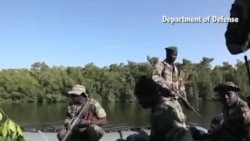PENTAGON —
U.S. President Barack Obama's visit to Africa will emphasize Washington's expanding economic and commercial engagements with the continent. At the same time, the U.S. military's presence in Africa has been growing as terrorist threats mount across the region.
The spread of militant groups in what were previously unaffected areas of West Africa, such as Mali, has prompted the U.S. military to pay closer attention and boost its presence in the form of capacity-building programs, like the one in which U.S. Marines train African commandos.
The U.S. also has stepped up its intelligence, surveillance and reconnaissance activities, setting up unarmed drone bases in places like Niger.
It is part of a plan to provide security assistance to Africa, without a large presence of U.S. personnel.
U.S. Army General David Rodriguez recently took the helm of the U.S. Africa Command, based in Germany. He explained why it is important for the U.S. military to maintain a small footprint on the continent.
“The history of the African nations, the colonialism, all those things are what point to the reasons why we should not go in there in force and everything else, and just use a small footprint with creative and innovative solutions to get high payoff from a small number of people, as well as come in for short periods of time to do exercises, to do operations, to help build that capacity,” said Rodriguez.
AFRICOM was started in 2008, and its focus at first was on development projects including livestock deworming programs with U.S. soldiers, sometimes in civilian dress, reaching out to villagers.
But analysts say that approach led to questions of what U.S. forces were really doing in Africa.
“There was a lot of consternation when AFRICOM was launched mainly because they didn't explain their objectives in Africa very well, and so people were very suspicious,” said Richard Downie with the Center for Strategic and International Studies.
The emerging terrorist threats have prompted U.S. forces to boost their intelligence-gathering and other military operations.
Downie believes suspicions have dissipated, though, as it has become clear the U.S. is limiting its presence on the continent and defining its mission better.
“AFRICOM's mission is becoming clearer, and as it's retreated into a more traditional operational role, I think it has actually helped AFRICOM's image in Africa," he said. "People understand a little bit more clearly what it's doing there.”
Analysts say it also has become clear this capacity-building mission is a long-term effort. U.S. forces are working with militaries that are largely untrained and lacking in professionalism in some cases. They estimate it could be a decades-long endeavor.
The spread of militant groups in what were previously unaffected areas of West Africa, such as Mali, has prompted the U.S. military to pay closer attention and boost its presence in the form of capacity-building programs, like the one in which U.S. Marines train African commandos.
The U.S. also has stepped up its intelligence, surveillance and reconnaissance activities, setting up unarmed drone bases in places like Niger.
It is part of a plan to provide security assistance to Africa, without a large presence of U.S. personnel.
U.S. Army General David Rodriguez recently took the helm of the U.S. Africa Command, based in Germany. He explained why it is important for the U.S. military to maintain a small footprint on the continent.
“The history of the African nations, the colonialism, all those things are what point to the reasons why we should not go in there in force and everything else, and just use a small footprint with creative and innovative solutions to get high payoff from a small number of people, as well as come in for short periods of time to do exercises, to do operations, to help build that capacity,” said Rodriguez.
AFRICOM was started in 2008, and its focus at first was on development projects including livestock deworming programs with U.S. soldiers, sometimes in civilian dress, reaching out to villagers.
But analysts say that approach led to questions of what U.S. forces were really doing in Africa.
“There was a lot of consternation when AFRICOM was launched mainly because they didn't explain their objectives in Africa very well, and so people were very suspicious,” said Richard Downie with the Center for Strategic and International Studies.
The emerging terrorist threats have prompted U.S. forces to boost their intelligence-gathering and other military operations.
Downie believes suspicions have dissipated, though, as it has become clear the U.S. is limiting its presence on the continent and defining its mission better.
“AFRICOM's mission is becoming clearer, and as it's retreated into a more traditional operational role, I think it has actually helped AFRICOM's image in Africa," he said. "People understand a little bit more clearly what it's doing there.”
Analysts say it also has become clear this capacity-building mission is a long-term effort. U.S. forces are working with militaries that are largely untrained and lacking in professionalism in some cases. They estimate it could be a decades-long endeavor.












